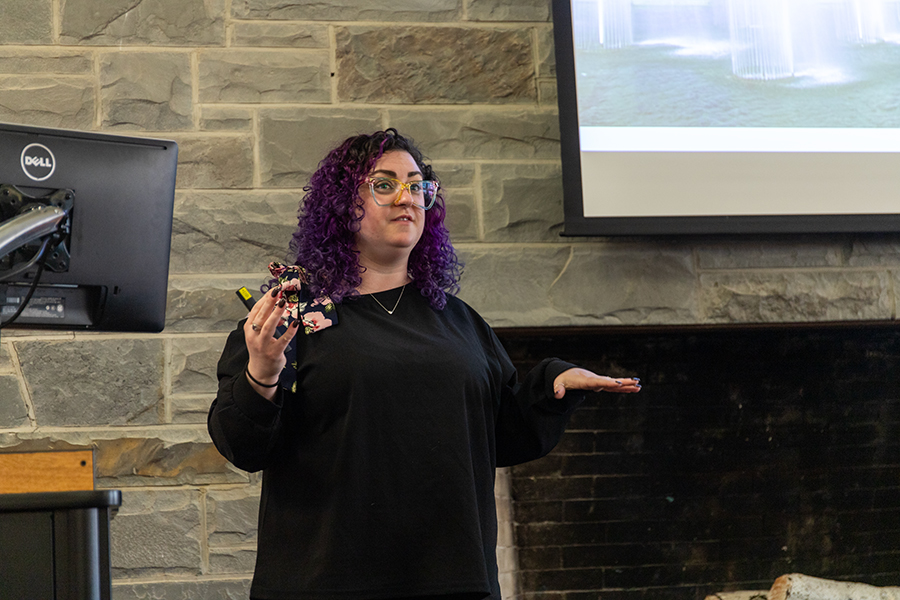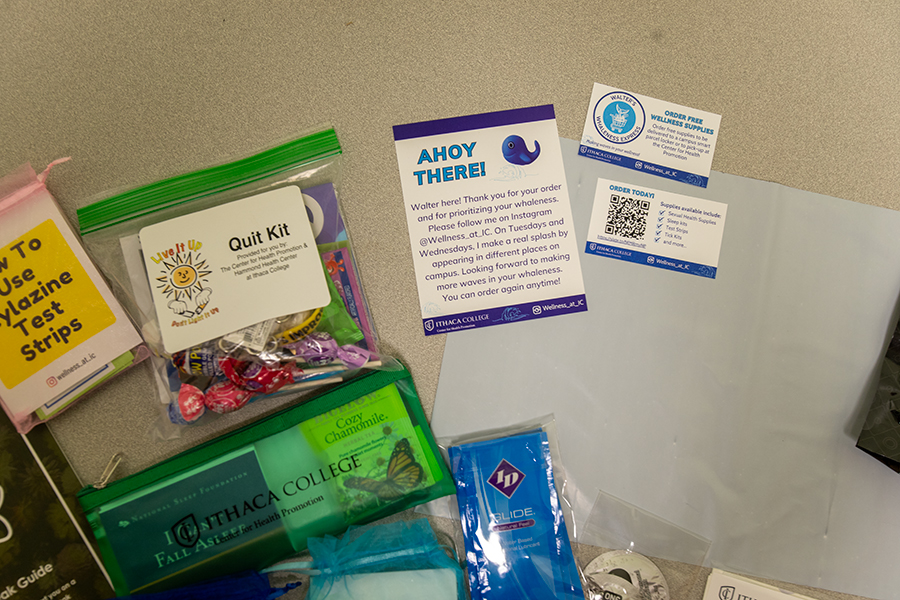Recent discoveries at a local composting facility reveal that compostable eating utensils used by Ithaca College may not be truly compostable.
Mary Proctor, one of the co-owners of Cayuga Compost, said the eating utensils used by Ithaca College Dining Services in places like IC Square and Grand Central Cafe have not been breaking down at her facilities.
Mark Darling, sustainability programs coordinator, explained that composting is the process of mixing together organic matter, such as food scraps, yard scraps and manure, and allowing it to decay. The end result is a soil-like substance, called humus, that can be used to improve soil structure and enrich the soil with nutrients.
There are now many disposable products, such as the eating utensils, plates and cups the college uses, that are supposed to break down in these conditions because they’re made of a corn-based material.
There are six piles of compost, or windrows, at Cayuga Compost that are arranged by age, separated by about two months. In the youngest windrow, all of the individual contents are clearly identifiable. Each successive windrow looks more like dirt. The final pile at the end is finished humus, which is about a year old.
Proctor said the compostable eating utensils are still obvious even in the oldest windrows; the spoons and forks may be bent or misshapen, but they are far from broken down.
Proctor said she is conducting studies at her facilities with the utensils and Cayuga Compost is expecting to receive a new piece of equipment called a screener this summer that may be able to grind them up to assist with decomposition.
If she can’t discover how to break the utensils down, she said, then Cayuga Compost will no longer accept them. For something to be considered “compostable,” she said, it must break down within a month assuming conditions are correct.
Denine Dibble, the director of operations for Dining Services, said the college sources its compostable utensils from Hill & Markes Inc., a distribution company located in Amsterdam, N.Y.
The cutlery that Hill & Markes distributes is manufactured by Green Wave International Inc. According to the Green Wave website, the company’s products are designed to have a heat tolerance “in excess of 200 degrees” and will break down in 120 days.
Darling said the college sources its compostable products from companies that have received the U.S. Composting Council’s seal, Green Wave International being among them. This means that biodegradable cutlery should meet all standards to be considered “compostable.” If they’re not breaking down at Cayuga Compost, he said, then there must be something wrong with the manufacturing process.
Darling also said an optimal temperature for the interior of a windrow is between 130 to 140 degrees Fahrenheit. Darling managed the college’s compost facilities before the waste was outsourced to Cayuga Compost in 2006.
“At 150 degrees, you’re actually starting to hurt the nutrients in the compost,” Darling said. “You’re starting to kill off some of the bacteria that you want to keep.”
Proctor said via email the average windrow temperature at Cayuga Compost is 125 degrees.
Mike Hicks, a Green Wave sales representative, said he has never heard Green Wave’s cutlery failing to break down and is at a loss as to why that is happening.
Hicks has documentation from the National Sanitation Foundation International as well as the U.S. Composting Council that shows the extent of disintegration for the utensils was 100 percent satisfactory and occurred under pilot-scale conditions within six weeks.
However, the fact that the utensils aren’t breaking down isn’t the only problem that Darling has with them. He said the idea of compostable plastic is often confusing and contributes to students putting the wrong items in the college’s three waste streams: trash, recycling and composting.
“I personally refuse to use the stuff,” Darling said.
He instead supports reusable silverware and products that are either paper or wood-based, both of which are guaranteed to break down. The college’s compostable plates are paper-based, but Proctor said Cayuga Compost doesn’t have any issues with those.
Sophomore Drew Olkowski, a senator-at-large in the Student Government Association, said he initiated a bill that aims to implement compostable eating utensils in bags at Grab and Go. Olkowski said he believes that compostable cutlery is better than plastic, and his effort to implement them is still valuable.
Katelyn Madison, Class of 2014 senator in the SGA, is presently working to get composting bins implemented in the Circle Apartments. She said this realization was surprising, and it undermines sustainability efforts at the college.
“It surprised me a lot that one of our big sustainability things that we do on campus … are in fact not breaking down, and they don’t seem to be as beneficial as they should be,” Madison said. “These things have to be beneficial or else they’re pointless.”
Proctor said she expects to be able to make a decision on whether or not to keep accepting the compostable utensils by this fall.






